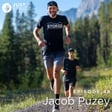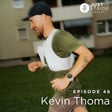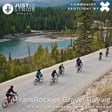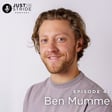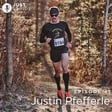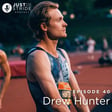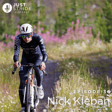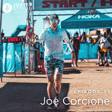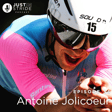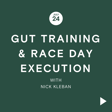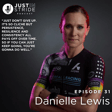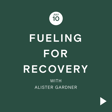Podcast Introduction and Purpose
00:00:03
Speaker
Hello, and welcome to the Justin's Drive podcast. I'm your host, Justin Puyese. If you love endurance sports, you've definitely come to the right place. On this show, we'll talk to athletes, coaches, and professionals who can help us reach our true potential. Being a student of distance running for over 10 years and interviewing people in the sport for the last five, I've learned a ton, but there's always more to discover.
Engagement and Social Media
00:00:27
Speaker
Everyone has a story, and I know you'll resonate with each of our guests as we embark on this new journey together. Join us at home, on the road, or while you run. Together, we'll have some fun. So follow along on Instagram at justinstridepod and your favorite podcast platform and prepare to be inspired. Come along for the ride with Justin Stride.
Sponsorship Message: Exact Nutrition
00:00:51
Speaker
This episode is presented by our friends at Exact Nutrition, a tasty and healthy way for you to fuel your body before, during, and after a solid training session. I can't leave the house without a few fruit bars in my pocket and they never make it back home. Exact is offering you 50% off your order when you use the code justinstride. So head to exactnutrition dot.com and fuel your goals today.
Life Changes and Priorities
00:01:14
Speaker
It's funny how life changes and with that, so do our priorities. What was important to you five or ten years ago may have little to no significance to you today. In a lot of ways, that's what makes life exciting. Trying new things, exploring new spaces, and learning new skills can be so rewarding.
Arianne Rabi's Transition to Triathlon
00:01:31
Speaker
On this episode of Justin Stride, I moved through the journey of elite distance runner and now triathlete
00:01:38
Speaker
Arianne Rabi. Arianne was born to run. She ran in soccer, then in school, and even earned a scholarship to continue running. We spoke about the success she had when she finished school, battling through a knee injury, and even how she balances training being a new mom. What was even more interesting was how triathlon has brought out the excitement for endurance sports in Arianne again, something she lost after a lifetime of running.
00:02:06
Speaker
Here and welcome to the Justin Stride podcast. How you doing? Good morning. I'm doing great to you. I'm good. I'm good. Yeah. Like it's a approaching afternoon for me early morning for you, but that's kind of what we're at now. So that's, uh, I'm super happy to have you on anyways, and I'm happy you could make the time in your busy life and busy schedule. For sure. Anytime I'm happy to connect with you, uh, at any time during the day, 5am for me, it's good. And like we go we go way, way back, knowing you for quite some time now, ah but obviously people on this podcast maybe don't know you. um Maybe some people do. And and and you know I met you
00:02:51
Speaker
kind of at a peak in in your competitive running career and as ah as ah an elite. And you just got into triathlon recently and completed ah a in Montremblant. Can you like talk about how that was for you?
Experience at Montremblant Triathlon
00:03:08
Speaker
Yeah, I think um I was looking forward to show myself ah that I could do it. um i was I've been training for, I mean, a couple months, I'd say, with a coach. ah Prior to that, I you know was just kind of learning the roots of all the sports, except the running part, obviously, but um ah very exciting. I don't think I've been excited
00:03:38
Speaker
that much in years about a sport. And I think that's why I make the switch from just running to triathlon. Um, yeah, I've been, been lucky with the weather compared to the 70.3. Uh, it was, uh, it was perfect weather, perfect water, uh, perfect biking condition. Uh, I couldn't ask for better and, uh, it went well. I, I think I executed better than my coach would have thought. And, um, I just had a lot of fun. And why, why do you say that? Why, why do you think you executed better than your coach would have thought?
00:04:18
Speaker
Well, because he told me. um No, but, you know, just joking. um I got up the water earlier than he thought. um And I actually heard his voice like, oh, Arjan is out of the water. um So that was nice. And I, you know, I think I surprised myself with the the time. Obviously, you you try to make, you know, small goals for, for each sports, just to keep the focus. um So I got out of the water well, and you know, you still have a long run to get to your bike, find your bike, put this stuff on. And I felt like everything went smooth in terms of transition. And the only part that I'm not proud was the biking. In Mont Haublan, when you do the 5150, you do the Dupless C twice.
00:05:13
Speaker
And I had practiced that part, you know, on the training camp, uh, one, one prior to the race, but, uh, it was much harder, uh, that day. Um, so couldn't get the legs going, couldn't keep the focus. So, uh, just try to maintain, you know, my position and pass a few girls, um, ahead of me and, uh, you know take the gels, take the water well, so my run would be you know pretty solid since it's my my main my main sports, the one I excel the most. and I did pretty well with the run. I made one small mistake, I would say.
00:05:54
Speaker
um ah I had this idea of trying with no socks in my shoes to save a couple seconds in the transition and I saw this debate on actually on Instagram about not wearing the socks and I was like, I'm just going to try it. And I did practice, you know, during some breaks in my training and it went well. But I guess, you know, when you run a full 10K, things can happen. And I guess I had a bit more, you know, sweat or water in my shoes. It wasn't great. So I came back. My shoes were white in the beginning and they were red at the end. So Jesus.
00:06:36
Speaker
Um, so that, that didn't feel good for five key. And, um, I think that's why I sold down a bit, but, uh, still proud. I, you know, place a ninth woman overall, overall first of my age group. And, you know, the time was, uh, decent, I would say for first one. And at least I have something to build on for the next, uh, you know, for the next races. And, uh, yeah, overall I came back and I was, uh, I was proud. I, there was a positive race, uh, to build from, uh, in my training and you know, he's still.
00:07:14
Speaker
having those months of training, you know, you still feel like you're, you did something and there's still something ahead. So very happy with it.
Course Challenges and Preparation
00:07:24
Speaker
Yeah, great. That's super, super nice. And like, um, one thing that stood out was like, I know that course quite well, cause I've done it also. yeah The challenge with the duplexi for people that don't know, particularly on that course is that it's just like, heels. Shortly, like right at the beginning, basically, it's a climb. And then yeah the fun part is the second half of it is a descent. And you do that twice. But as far as getting a warm up for your legs, you don't really get a chance. It's like, let's start climbing and you do that. Right.
00:07:59
Speaker
And it's like right away. So there's very little chance for that, but you just, you gotta try and get in a rhythm as best you can, but also with the heart rate and stuff, it can be challenging when you're trying to push it a bit and, and just start the ride, you know? So, but yeah, it sounds like a good experience. And, um, what were the, what were your main concerns going into it being like a new brand new event for you? You know, normally you just put on your running shoes and go. Right. Um, you know, there was a lot of things to bring in the morning, uh, you know, getting ready. I ah was like scared of forgetting something. I think that was one of my main concern. Um, and then, you know, for the the swim part, you had to choose when you wanted to start, like with what time group. And I was like, I didn't think about that. There's a few things that I,
00:08:56
Speaker
I guess I you know came up the day before and I was asking questions and you know I had good guidance, obviously. I'm part of a ah good triathlon group based in Montreal, I'm bar coaching. um So there's a lot of experienced triathletes on that group and we have like you know group the chats uh, for swimming for, for, you know, just the triathlon too. And, uh, whenever you ask a question, there's always someone that's going to answer you. And, you know, if it's not a coach, it's, it's like I said, it's that someone that you train with. So, um, all the questions I had, and you know, I had support for that. And, um, so I was well prepared, uh, the day of and and the day before when I got there. So, uh, didn't have that many concerns. I think I, I.
Triathlon Training and Fitness
00:09:47
Speaker
and was well prepared nice and do you think do you find the you know you have so much race experience and we'll get into that as we go along here but do you think that somehow that's help that helped you or maybe made you feel more comfortable Just as a race setting in general, even though you had three sports to think about all this gear to think about, like, do you think that all that experience leading up to this point, not only with the training group, but as yourself as an individual creates like a certain calm that you can apply in a competitive, in a, in a competitive way, in a new sport.
00:10:27
Speaker
Definitely. um And I think that's something that you know I talked with my coach when we started together. um you know I told him, you don't have to hold my hand. We don't have to you know talk you know constantly. I've been training for so many years. um you know There's a lot of things that carried on with me in terms of you know athlete stuff like confidence. um structure, discipline. and you know When you tell me how to do a workout, you you can trust that's how it's going to be executed. um you know So I think when i start when I made the decision to move to triathlon, all those things went with me. you know I have a pretty good head. I have good self-talk.
00:11:25
Speaker
um So yeah, I think all those things really benefited me when I started and probably gave me you know a step ahead of of most ah who who make who make that switch. um And it helped with just executing. We have a lot of things going on in that training plan. So and it did help a lot in the beginning. And do you notice a difference in the the culture or the the types of athletes between triathletes and just pure like runners, let's say? Oh, yeah. um you know One thing I've noticed when I started training with a coach was that um there's a lot going on in the training plan. And you can't like you can't miss one training. You can't move things around. It destroyed the core of the week.
00:12:22
Speaker
um But one thing I've noticed is i'm I'm way more fit in terms of like, uh, I don't know if it's like strength or power or I can feel it. I felt it at some point, I think, um, in the spring, uh, when I stepped out, you know, there's no more snow on the ground. I felt like my stride was much more, uh, powerful than, than when I was just a runner. And probably because you're doing a lot of cross training, but I would, I would think this is, this is how I felt like going from. so what i How I can relate to that is when I was doing like the 70.3s, I had done a couple with the plan of doing Ironman the following year. And then I raised a marathon a month after my second 70.3 that year, but I had never ran the marathon.
00:13:19
Speaker
And like I didn't even know. like I just was like, oh, I need to go run a marathon to get a sense of what that feels like, because I don't want my first one to be in and in an Ironman. And it went super well, they but because I was fit from the triathlon training, even though I wasn't like run-specific focused. All the combination of all the sports made me strong enough to do the the marathon. So I can agree with you 100%. Like it's, it's really fascinating, right? Yeah, it is. I, you know, I think by doing the training and you know, I only did a 51 50, but I have so much respect for this, for the sports. I mean, I have so much respect for, for any sports, but
00:14:06
Speaker
The fact that you know there's an ironman, the distances for a 70.3 ironman are unbelievable. I look at it and I am amazed by people doing it. I think the fact that there are three sports involved and you have to keep the focus for each. It's it's amazing how someone can can do something like an ironman. I'm still ah very um fearful of of that distance. I don't know when I'm going to maybe want to do one, but um I just think you know knowing how much it takes to train for just a 5150 and a 78.3, it's so much respect.
00:14:56
Speaker
Yeah. And it's just a different time commitment, you know? It is, yeah. I mean, I don't know if I could train for now, you know?
Training Time Commitment
00:15:05
Speaker
But at the time I was like, you know, I had a nine to five, but like I was single, you know, you could afford to train for your, you know,
00:15:18
Speaker
10 hours on a weekend, no problem. like just go for long rides and long rides and back to back, you didn't care. um That was the priority in life, you know, but as, you you know, as you move along, you know, as I get older, like you just don't have that time. There's more people involved. Yeah, it it just doesn't, you know, you could do the training, but you'd upset a lot of people for sure. Yeah, exactly. So that being said, like, you know, when I met you, you're probably really focused on like fives and 10Ks. Do you think you'll stay in the 5150 now for a while and try and
00:15:49
Speaker
like I know you you know you like to be you're competitive, you're you got fired. It sounds like you've got some passion back for this new sport and this versatile type of training. Do you think you'll stick in that for a little while and and try and perfect it? Right. so The goal this year was to get an introduction to triathlon and what it you know what type of training it takes to to master one distance. Um, so this, this year, mostly 51 50. And, you know, I did talk to my coach about doing maybe a 70.3 at the end of this year, but I'm still, um, you know, the, the, the bike distance scares me as a, just gives me a bit. I think that's where I'm like holding off maybe for the first year. Um, I think, you know, I'm not, I'm not scared of the swimming part, the distance.
00:16:47
Speaker
more confident in the pool than I was in the beginning. But, um, my time on the bike is, uh, I'm having a hard time with the bike and my, my coach did tell me that it takes some times to just build that muscle mass, that power. Um, so I'm trying to be patient and and embrace the the process and the training. So, uh, I'm doing another 51 50, uh, this month, no, sorry, next month. And maybe another one in September, kind of like a back to back. Yeah. The Montreal, the challenge is free. Yeah. So hopefully having a back to back, like, I think there's like three weeks or a month in between each nice and you recover, you recover pretty well from a 51 50. Like you can bounce back pretty well. Um, it's like running a five and 10 K in the same month, I'd say. Yeah. So.
00:17:43
Speaker
Yeah, i'm I'm looking forward to just see how I how i process that. And if I'm calling, you know, the end of my year or if I keep going. Nice. And um entering a new sport, like I know for me, swimming was like my Achilles, like it was... And like biking, you just think, oh, it's biking. It's not a big deal. But like, there's a lot to be gained in terms of time on a bike, especially my god yes how much further you go. Like, if I compare it, I just did a 70.3 this year and first time back in five years or so, but i so I knew another guy racing and we were comparable like kind of swim times and run times, but the bike time took 30 minutes off and I was like, you know, I'm like a tourist out there and he's pushing, but it takes time, right? So did you see a big improvement in in swimming first or is it, is it biking? Is it hard to tell at this stage or?
Swimming Training Journey
00:18:41
Speaker
I actually saw a lot of improvement in the swimming part. So I've been trying to so i've been trained to ah and find a group that I could just join you know a master club for swimming. And it's been it's been very hard in the beginning of the year. um Everything was booked. Um, and it's not like a running club where you can just add one more, you know, one or two, and it doesn't matter in the swimming world. There's lines and, uh, you can't just add someone. So, um, uh, luckily I think it was sometimes in April, um, there was a spot in my town, uh, the blue fence in Beaconsville. And, um, someone told me there was a spot available and I jumped.
00:19:32
Speaker
right away. um And that was perfect because the the training was at 5.30 a.m. And for me, you know, that time is just perfect because I can ah can double that day. If I start later, then it's harder with work as much as I have flexibility with my employer. um And when you train at 5.30, it's like, you know, after a couple hours, it's like you've done nothing. You recovered, right? So having that twice a week during the weekdays was just, uh, yeah, it was a blessing. It it kind of pushed me to, um, progress so much faster than if I would have been, you know, just alone. And so I did a Monday, Wednesday with them. And on Friday I joined, uh, my coach's group in the morning.
00:20:26
Speaker
Um, so having him, you know, just looking at me in the pool and making some comments about like techniques, um, you know, and then often what we would do is, uh, just talk about our, you know, the training plan after the session. And so it's, it's a good way to connect with your coach, uh, about, uh, all aspects of your, you know, ah three sports, but the, the swimming part, you know, I started off. So I started swimming exactly, I think it was around August, September, 2023. So I have no swimming background. I did take lessons when I was a toddler or something, I don't know. But it's not like I come from a background of swimming. So I can't remember exactly. I think I watched some videos online, like YouTube, just to see a bit how someone
00:21:23
Speaker
do the stroke or the catch, whatever, learn the language as well, gain the knowledge. Um, and I can't remember, I think I took some training plans from, uh, Garmin. Um, so I could have something to follow, you know, on a weekly basis, uh, cause I, I don't know swimming. I can't just make up a training, a workout or. know, the the drills. yeah Um, so I started off like that in the fall. And, uh, I think I was swimming two or three times a week at that, at that point. Uh, and just started like that. And when I met with my coach in December, cause I felt more confident that, you know, I had a small background to start off yeah from, um, he gave me like,
00:22:14
Speaker
a big chunk of like, it was much harder workouts, but, uh, you know, you have to build those muscles. You have to learn the drills, the right technique. So, uh, we started off three times a week and sometimes I would add a fourth session whenever, you know, I have room in my training plan, uh, in my schedule. And since then I, so I started from, most of my sessions are 3k, sometimes a little bit less. sometimes a little bit more, but approximately 3K. I don't have, um you know, hours in my day, and unlimited hours in my day to train, unfortunately. So for me, ah training go as far as I can. I allow it in terms of like time. If I have an hour, I have an hour. I can go beyond an hour. And that's, you know, that's
00:23:10
Speaker
I guess that's the reality of my life now with a toddler in ah a full-time job. So yeah so do we watch but you have you have? So swimming with swimming, you know, with the hours that are are available to me, it's hard to progress much more when you only have an hour. um But very proud of the time that I started. to the time that I am now. When I swam in the 5115 Montremblant, I was aiming for a pace at like 145 per 100 meter. And um I came out the water with a pace of 147. So overall happy with it. um You know, I did
00:23:58
Speaker
um I did swim off the line in the beginning, so that that killed the pacing. But um you know overall, I swam lessened than the distance, the 1,500 meter. um So it's not like I swam more and you know ah slower. So I think the time in the pool did pay off. Yeah, and that's solid that's really solid. And I mean, two, three, four times in in the week, like if you're getting three or four times like ah times per week in the in the water, I think you can make big improvements also. yo yeah Yeah, it sounds like sounds like you had proper guidance. and
00:24:41
Speaker
you know to your point, when you, when you have a coach there with you, they can really point out and correct things in the moment, you know, that you can't see when you're in in the pool without, without a camera, underwater camera and stuff like that. So yeah, there's so much, there's so much to swimming compared to the other sports. I think, uh, you know, if you don't want to drag in the water, You have to make sure your, your, your fingers, your hands is at the right place. Your elbow, when you do your catch, um, there's so much to the swimming technique where you can progress in, you know, in the water. Um, I think that's where you have to spend more time, especially in the beginning. And, you know, it was something I didn't like or appreciate, you know, especially in the winter when you get in the water, it's cold. Yeah.
Open Water Swimming
00:25:31
Speaker
um But i I think because I spend much more time in the swimming and swimming than, you know, maybe a bit less than biking at certain periods, i I started enjoying it a lot more than the beginning. And I actually look forward to swimming sessions now. Uh, same as like open water, you know, yeah it's so different than in the pool. Uh, it's like a different world. So I never, I never swim in open water, uh, prior to, um, doing my training camp in Montrebleau in May. So that was something that was, uh, that brought a lot of fear, I guess. Um.
00:26:18
Speaker
and i did After that, I did practice. I have like a ah big lake close to my house and it's pretty nice water. There's no like stream or it's a bay. Practicing there ahead of the race, was just it it was necessary, but it was also very enjoyable. I discovered something like and another I guess you can call it under the sports, open water. Um, I was, it just brought a lot of excitement, discovery. You know, you feel like a little child learning something, something new. that's awesome Very cool.
00:26:55
Speaker
Well, I love hearing that. I mean, I think this is something, you know, people put a lot of stress on, on sport and performance. And even when they're new to a sport, they want to perform or there's this, you know, always this, um, the risk of compressions and yeah, and this unnecessary pressure, but when you describe it the way you have and, uh, and take it that way on a daily basis and make sports so much more enjoyable and, and the training more enjoyable. And, and I think a stress-free athlete is a, is a better performing athlete too. So that's, yeah that's good. We're lucky to be able to do it. Right. So it's, uh, exactly. I think that's, that's the mindset that I, when you just mentioned the mindset that I, I brought in triathlon, I think with running, having all those years, you know, with me that I carried on forever, I feel like it's been a long time. Um, I just wasn't as excited to get in, in certain workouts. Um,
00:27:53
Speaker
you know You run the same routes, the the the same yeah the same workouts you know over and over. and I just wasn't ah just wasn't as excited. i Even sometimes I was like, I'm not doing it today. I think I and was putting so much pressure on performing in the same distances. i just yeah Changing sports brought so much more excitement and And, uh, stress free, like you mentioned, I have, uh, no injuries, uh, maybe because I'm frustrating, I'm less on my feet, but, uh, yeah, just much more excitement. Yeah. And, and swimming's a great, like, even though you're doing workouts, you know, it's way, it's, it's a low impact, right? So the same with cycling, it's low impact. So you can still yeah push, but you're not getting the same like pounding on your feet that you do in running. Yeah, totally.
Influences and University Racing
00:28:48
Speaker
So, you know, you mentioned all those years before, maybe we talk a little bit about that. We'll kind of shift focus here to kind of where you're from. How were you as a kid growing up? or you Were you born an athlete? and and kind of how Yeah, let's dig. Yeah, let's dig a bit. Yeah, so I was born in my hometown, Rapantsee in the Kimbukk Province. I've never moved. I've always stayed there with my parents, my brother and my sister. And I grew up a very active. um So my mom was a physical education teacher. And my dad is a juror, so nothing with relationship in terms of sports. but
00:29:35
Speaker
Um, he grew up active as well. So, uh, you know, we did a lot of sports. My mom, I guess was trying to see what sports I liked, uh, that I was good at. So she put me in a lot of different sports from, you know, I did up in a bit of swimming, I did soccer, I did, uh, you know, ballet, uh, tennis, I mean, name it, I propped on all of them. And, um, I did stick to soccer when I grew up. Uh, I was very good. um So I started competitive, I think just few years few years in, I think it's called got A or three boys or something like that. and
00:30:15
Speaker
and i was recruited for the national team one year. That was at the end of, I guess, my soccer career. When I started doing track at the same time, um I had to make a choice. And so I, you know, I was winning a lot in track and field, so i I decided to split from soccer at that point. I think it was probably 15 or 16 years old at the end of high school. And I had a ah coach at that point, track and field coach, Josie.
00:30:47
Speaker
And we were ah a small group of athletes that were performing very well. So we were lucky enough at our high school in Quebec. We had a track, and another track. And that's, I would say for the Quebec province at that time in the year it was, but we didn't have a lot of track, other track, especially if you, you know, right next to your high school. So. you know, we would meet there after high school to train there. And we became one of the best in the province. A few were, you know, in the nation was, you know, we were pretty good in terms of like Canada rankings. So I was doing the 800 and the 1500 at that point. And
00:31:38
Speaker
I got a scholarship to go to the US. We all got a scholarship actually in that group. So we went all different places. So I went to Indiana University. um I did five years there. So usually a bachelor is four years in the US. And if you get injured, you can, I think it was called red shirt. So you can save a year, transition to another year to save your season that you missed when you were injured. So I stayed there, ah I think it was 2009 to 2014. And fourteen and um i I had the intention of staying in the US, but for some reason last minute I decided to go home. I can't recall my thought process at that point.
00:32:33
Speaker
But I think I made a good choice. I had in mind that I wanted to pursue professional running career. And I had actually a spot on a pro team that was sponsored by Brooks at that point. And they were offering residency. It was a pretty good group. Um, it was actually overseen by Steven Haas, who's a professional professional agent. Pretty good. Very good. Uh, he's based in Flagstaff. Actually met him here. Um, actually, yeah, I met him in Flagstaff few years after. Oh, nice. Um, so yeah, I decided that I wanted to go home. I was homesick at that point. I just needed to be with my family.
00:33:23
Speaker
Um, I think I was also, I realized that I was kind of sick of running on a truck. I made that choice within, I think a couple of weeks. I was like, I'm not doing this. I'm going home and I want to, I want to, you know, I want to work. I want to use my bachelor degree. So in home in 2014, and, um, I didn't get a job and, you know, I was staying with my parents and I still enjoy running. So I. I took a break from it for I think three months and I restarted doing a bit of a running, just easy runs, build my mileage. And at one point I was like, yeah, I think my mom was telling me I should do road racing. I think it came from my mom. My mom was ah used to do marathons. So so i I think he came from that. And so I was working as a kinesiologist, a coach.
00:34:20
Speaker
And, um, I took a plan online for road racing. I think it was five a four or five key. Yeah. And then after that, um, uh, that's when I won my first five K in the fall. Yeah. Nice. And I actually enjoyed it. I had a lot of fun and the atmosphere, the atmosphere, the the vibe from, you know, coming from track to road racing was so different. There was a lot of cheering. ah It was just a beautiful community. um So I really enjoyed that. And I was like, um I think I'm just going to do that, just from racing. um So I started looking at you know online, reading about it. And there were so many races that you could do a year round. And I actually loved that. you know You didn't have to wait for one season exactly to perform. And before and you know you can travel. It was ah it was interesting. Nice.
00:35:17
Speaker
yeah When you were away at school, like was it did you enjoy that time like competing as an athlete and going to school? what was it Because you hear like mixed reviews on like yeah specific programs and how how they push their athletes. and were were Were you happy doing doing track and field? Because you said you got sick of it at a certain point. So what why did you get sick of it? um I think that was the fact that we race so much. Um, it wasn't so much about how much we were training. I really enjoyed, um, the training there. It was so diverse and, you know, I was doing, I was sub vers at ah versatile as an athlete. I could sprint and I could run long. So, uh, my coach sometimes would like trial me on different workouts and I actually really enjoyed how open-minded he was, uh, when we had conversation. Um, so I was doing, you know, cross country.
00:36:16
Speaker
to track year round so I was basically training for from you know August to August yeah um but you know I think it was the fact that we were racing so much every week ah multiple races that at some point I was like I'm I yeah I was ah I was sick of it I you you're always on the same the same distance and going left and left and counting the laps. you know
00:36:48
Speaker
um I think that I enjoyed most of my years. I think some years I was very injured and there was not a lot of support when you were injured. So that thing, that's the downside of, I would say, not being home, being away and being the outsiders because whenever you're in the U.S., if you're French or if you're coming from, you know, an international country, you're you're you're always the outsider and they see you that way, you know, a year your points on the team. of I think sometimes it's different for certain people, but that's what it was like for me when I was in Indiana.
00:37:36
Speaker
It was very hard to connect with people in the beginning. um My English wasn't great in the beginning. Actually, I wasn't speaking very much. So I did have to learn you know more English throughout my first year. and being and We weren't in the South, but most people had a Southern accent in Indian. So that was much harder to understand for me. um So I think that connection didn't come naturally in the beginning. Uh, but my, I really enjoyed, uh, my coach was, uh, it was, he was great. He really loved, um, how hard I was working and he was very supportive. Um, I didn't, I never felt that at some point, you know, during during those five years that he didn't have my back. Um, yeah. And he, he actually passed away, um, two weeks ago from cancer. So, uh, yeah.
00:38:34
Speaker
he He was a nice person. Wow. Okay. Um, and, and, and have you, have you always been that way? Like where you, you work hard and you can dedicate yourself and, you know, stick with the plan and cause that's all I know of of you. You know, ever since I've met you, you have always been that way and you don't miss, you don't miss days. And I mean, um, I think it comes from my family, from from s seeing my parents, ah you know, working hard in in throughout their life. I've always seen my parents going on. um My parents are super healthy. My dad is an entrepreneur, you know, so he always logged in a lot of hours. He was in home very much when I grew up, but he was always there for, you know, activities around the weekend. He always made sure that he had his time with us.
00:39:33
Speaker
So I grew up with you know these two figures, parents' figures, where working was, it was valued in my family. um They both had two degrees. ah My mom has a master degree. So you know school was very important as well.
Family Values and Work Ethic
00:39:53
Speaker
So I think I just learned from a young age that working hard brings results and happiness, I guess, in a certain way. So it it was never, it was, I've never learned either way to go in life. And I enjoyed it, and you know, I enjoyed structure. I enjoyed hard work. Never felt like I was pressured to do so either. My parents, you know, they never put pressure on us. My mom never put pressure on me to get, um you know, a master's or,
00:40:28
Speaker
complete my bachelor's. I think they just thought that that was the way to do you know to go through life. you know You go to school, you work after, so my sister is the same way. and I think that's how most people see it too. you know and You know, that you, these these are the steps that you need to take in life to kind of have success, right? That's the avenue for most people. I think that's pretty like sounded advice, you know? Yeah. um You could go different ways, but, and still have success, of course, but it's not, you know, I guess the ah highest percentage of success. Or it depends how you define success also, right? So. Definitely. Yes. There are different different definitions.
00:41:14
Speaker
and And who do you think saw the potential in you to, to, you know, cause eventually you're, you know, you were, you were quite successful as an elite athlete and winning races. And I mean, from what I remember, like you were competing in these road races and just winning everything, you know? And so like, was there a moment where you realized this potential in yourself or did someone say like, Ariane, you have a talent for, for running and you should. you know It's good that you've got an education, of course, but like that you can make something out of running. i mean I never thought about making something out of running. I think I always saw it as a hobby. When I won the Montreal Marathon, um that brought on a lot of attention. and I think that's where it started off. you know
00:42:04
Speaker
Arian has this potential and some people were talking about the Olympics and I was like, wait I'm way too far from this. People were just excited, I think. But, yeah. um You know, i that was never a thought in my mind to go to the Olympics. I actually don't want to. I think it just would bring too much pressure and and I would have to only train. And that's not what I want from my life. You know, I don't want to just spend my days just training. I want to use my brain. I want to use my degree. All those years I spent studying, i you know I just see my life with other, I see my life filled with other things to bring me happiness. And so when I started you know winning these races, age just it was exciting. you know you You're getting all that and attention. You're able to travel to different races. People will look up to you.
00:43:04
Speaker
hello you know I got a ah sponsorship from Sketchers. That was my first one. and it was it was i mean It was amazing. I was getting these free shoes, free clothes. I had a community. I had you know support. I really enjoyed my time with Sketchers for all these years. um yeah I learned a lot of things with that as well. and you know i was i just I was just enjoying the ride, I guess, you know and getting sponsorship from products and stuff. And that was fun. And the Montreal Marathon. um Was that the one I ran with you the first bit? Yes, yes.
00:43:48
Speaker
Yeah, we have history. We have history to prove it. We have history, yeah, exactly. And I said to myself that day, I was like, oh, if I can, I'm nowhere near your level, but if I can hang on as long as I could, I'd probably PB that day. And I just crumbled, I think, around 33K. And you, you know, you kept going, but I still PB that day. You did. You did. Which was fun. And that was, that was, that was an exciting moment. Yeah, yeah. Yeah, it was a good day. A beautiful moment. Yeah, yeah. Yeah. And yeah, the win in Montreal is, uh, it was awesome for you. your whole time Yeah, which is amazing. So, um, and, and so like, did you, did you enjoy getting up to
Marathon Training Curiosity
00:44:31
Speaker
that distance? Cause you were so like, I remember you were kind of a special, you know, specializing in a 10 K at the beginning.
00:44:37
Speaker
Like what made you eventually want to move up? You know, you were doing 10K, then half, you slowly kind of made that progression to going further and further. And I know you did face some injuries later on. Was it the same stuff that you, is it always a reoccurring injury or is it, was it something different that you faced? Um, was it when you added more mileage and more distance to your training plan? I don't know. I can't remember exactly how it went. but Yeah. I think, so I think it started off, um, well, just to answer your first question, you know, beginning up to the marathon, I think it was just curious as I, as I was moving, you know, along the road racing world, you know, starting off with a five and 10 K. I think I was curious about the training, what it would take to move up and how much I would enjoy it.
00:45:27
Speaker
um And then when i when I won the half marathon in Ottawa and I reached my goal, I think at that time it went 118. And it was, you know, at that time in 20, I think it was 2016 or 2017, it was, you know, a fast time, 118. And there was not a lot of people doing road racing at that point, but um I was curious once I did the half, how much it would take to move up to the marathon and and complete the distance. And, you know, the marathon distance is like a legendary distance. People are like, wow, you ran a marathon? 42.2. So it didn't take much training from, you know, much more training from what I was already doing.
00:46:12
Speaker
So I was just, I think it was um a question of, I was curious, you know, taking those gels, the water, I was curious about the the, how, how, what it would take to fall for that, for that race.
Injury and Pandemic Reflection
00:46:25
Speaker
And if I could win it, you know, it just brought excitement, I guess. um I think I started being injured. So I have this recurring injury from my knee, my right knee. um I think it's just overused. I had some issue in the past when I was doing track and field, you know just soreness, constant soreness. And it was never a big deal. It never prevented me from you know running or just keeping on going. um But for some reason, I guess when i whenever I would increase my weekly mileage
00:47:05
Speaker
Even if it was progressive, uh, you know, throughout those past years, I've tried very progressive. I tried, uh, maintaining, you know, 90, a hundred K just to see if I maintain that longer. And then, then I move up. If, if it triggers some things and for some reason, when I get close to, um, exactly a hundred, um, that's when my knee is like, no, it it's ah It doesn't work. Um, it's some, some sort of arthritis, uh, arthritis. I'm not quite sure, but yeah, I've done so many and MRIs now it's, it, you know, it's mechanical. Um, and the stress on it, the instability just cause, uh, so much soreness that at some point it just can bend maybe more walk on it or go up and down the stairs. And when you're like in, you know, being in
00:48:02
Speaker
Uh, your, your thirties, uh, it's scary, you know, you still want to be active. You want to go down on your knees to pick up your, your child or play with her. You want to be able to, you know, go on a hike with friends and, uh, you can't because your, your knee is, uh, your handicap. Yeah. So I think it just built up um as much as I was progressing in the marathon and being a mileage, it became ah more and more of a problem. And every year I would have to take at least ah three months of my training, sometimes all at once, because it was so much so injured.
00:48:49
Speaker
And sometimes I would have to take a day off during the week or, you know, reduce my long run or just stop running for two days to come back progressive. So I was never able to move forward with confidence with my training. And that was that became an issue um more and more at the end. So when the pandemic hit, I was like, wow, this is this is a good chance for me to you know, work on that knee and try to build, I don't know, strength or something else. And it just never made a difference. Okay. Yeah. So you kind of had to figure out something else. Is that kind of where you took that triathlon direction to say like,
00:49:33
Speaker
Well, so in, in 2020, uh, you know, for a lot of people, but the pandemic was very hard for their mental health. Uh, for me, uh, 2020 was a big year because I moved in a different town and it's a beautiful town where, you know, you have beautiful roots by the water. And that's when I, I was, um, I was actually supposed to run the Houston marathon in, in January, 2020. And I, again, got injured for my knee. So when I moved in my, in my new home, I was still a bit injured. Um, so it just starting running again. And that's when I, you know, in my mind, I was thinking, do I still want to do this? You know, it's hard to get injured constantly, especially with the same injury. Um, and at that point I had chronic pain. So not only I had to stop running for a while, I thought the pain would go away, but the pain just never went away.
00:50:31
Speaker
at that point. um so i was ah Mentally, I was not well. a ah Sorry, I didn't phrase that well. I wasn't depressed. I was in pain and my sleep wasn't great, but you know i it just didn't bring enjoyment anymore. Walking was becoming a struggle. I i was sir yeah i was not happy with my how active I was at that point. So I was questioning, you know, um would it make sense to come back to running? And I did, I think I did for a while, I rebuild and did some races in 2020. I can't remember if I did. I don't think I raced in 2020, but I did some, I did one trial, a 10K trial for fun with some friends.
00:51:26
Speaker
And, uh, when my husband, we decided to, uh, have a child. So at that point, it was, you know, for a lot of people, it was a good time to have a child there at home. And, you know, you know, I was working at that time, but, um, it was a good time to pause those questioning about the sport. I think yeah i give them to refocus on some other aspect of my life. Yeah. Yeah. and move yeah and like Back to what you said before, you viewed running as a hobby. you know i viewed it I viewed you as an Olympic athlete, but you viewed it as a hobby, which me which speaks to how like gifted you are as an athlete and how dedicated you are, I think, you know with the right health and everything. you know
00:52:17
Speaker
Who knows? But it's not everyone's destiny, right? And we have a funny pregnancy story, right? Because I came to see you. I came to see you a month before you were due. All your fault, Justin. All your fault. I brought you some donuts. And lo and behold, that night you went into labor. Yeah, the kid loved the donut so much she wanted to get out. I could not move believe could not believe you believe it. That's good publicity for leche desserts if anybody's in Montreal and likes vegan donuts or just regular donut go with labor. Yeah, early exactly. Just have those donuts. And you know what? It's funny because I listened to another podcast, the hockey podcast, and the guys were talking about a specific restaurant where if you have this like eggplant parmesan, this is the this is going to push the baby out. you know And it's like no it's known for that. So when I heard that, I was like, oh my God, maybe these donuts are also one of those those foods. so
00:53:21
Speaker
They were good. a What I'm really sad about is when I went in labor, I didn't bring the bucks with me in the room. So they stayed in the house. Half of them stayed in the house and weren't good enough when I came back. Oh no, oh no. We'll have to get some more then next time I'm yeah i'm in town. But um I actually wanted to talk too, because you did mention also at the that at the time, that was a good your half marathon time was good. And at the time, not many people were running the distance. you know So much has changed in the sport over the last
Progress of Women in Endurance Sports
00:54:00
Speaker
oh yes The number of people running, the number of people running marathons, it's crazy. Everything sold out, you know? But maybe wait, if you could speak a little bit to to that, but also like how far like the women in the sport have pushed the sport and the times and the Olympic times and to see like, you know, Melinda Elmore going back to the Olympics and you know at her age and after kids and and all this stuff. like How how like inspiring is that that for you watching and and also to be part of that? ah Very exciting. I mean, you know you're talking about Melanie Elmore. My husband used to run 800 meter and you know he went on and he was on national teams with her. So you know thinking back about when she stopp when she did her marathon debut,
00:54:53
Speaker
John and I and my husband were talking about how how incredible it was to want to come back in such a competitive distance, an Olympic distance, and perform that well. You know, she broke can Canadian record and, you know, we're talking about women, but we're ah we should talk also about age, how you see a lot more women performing in that distance, but older, I mean, older. older than expected um woman in and in the sport. a Seeing a woman performing in their 40s is exceptional. It breaks that mental barrier where you know you you think you you only have your your early 30s to reach your limits. um it it you know It's inspiring to see that Melanie is a mother of two young, you know she has two young son,
00:55:51
Speaker
And, you know, she manages to, and her husband is her coach. So it's like, you know, it's a family, a family business, almost like a family mother, um, seeing her wanting to come back in, in such distance. She used to be a 1500 meter runner. Um, you know, it takes some guts. It takes some, some willpower and, and I'm sure she, um, she I mean, she used to do triathlon too. Before that, I remember. She was and she was a very good. oh yeah yeah Exceptional. so you know Maybe she's the exception of the exception, but it's still inspiring to see that it's possible um to to make the time from your family, from your job at that age and perform. so It definitely brings um you know hope and excitement
00:56:48
Speaker
And you know, I think there's going to be more and more women doing it. So it's going to become the norm. And you see like also like the Christie Duchain's of the world that that did it too and and are still exactly seeing long yeah distances and um Yeah, it's super inspiring and like it just makes you I think it makes them so like relatable at the level of like I can start a family and then I can still have that that athletic balance in my life and
00:57:22
Speaker
It open opens up conversations that we wouldn't have had five years ago.
Balancing Family and Training
00:57:28
Speaker
And it's, you know, it's crazy because we're in the modern century, you know, 2024. So you would think that this should have come way earlier. It probably would have, should have, but, um, I think it's the, it's, it's perfect timing now that, you know, there's more and more women. You can have a carrier, you can work full time. you can have flexibility and you can build a schedule to be able to perform. And how is that transition for you, having a kid and getting back to, you know, your normal and but like, did you have fears about that or any like concerns about, you know, getting that part of your life back, like that balance in your life? Yes. Um, I think when I was pregnant, the fear was, you know, um,
00:58:20
Speaker
It's more about, am I going to be able to do it at all? You know, I think that's the only fear I had. Um, I knew that, you know, I wouldn't have the same freedom. Obviously you're adding one person to the puzzle. So, um, you know, I did practice having a dog before. oh yeah So, you know, I, yes. So Miles did practice in terms of like, you know, my schedule, you have to take care of someone, but obviously it's, can't compare both. Um, but I think having the right, uh, support system, you know, in place does help. Obviously, if you want to go train, um, you need someone to take care of your child, you know, during that time. So, um, having, you know, having that structure I had before did help, you know, when I had a kid because you're more, you know, time, you know, time management and,
00:59:18
Speaker
when you have a kid, time management is your number one skill. You can't go wrong with it. But I became, um you know, in the beginning of our interview, I mentioned I'm a 5am club member and I wasn't before I had a kid. And I wish I did. I, you know, I truly think I would have been, I'm already this productive person, but I, you know, I truly think I would have been exceptional with that mentality that in place. Um, waking up early, opens up the world to, uh, you know, you have so much more hours and your kid while you could sleep, you can train because when your kid is awake, you know, it's hard to do. It's hard to plan accordingly, uh, when to place, you know, your, your activities, because your kid brings a lot of things that you can't control. Um,
01:00:17
Speaker
You know, fatigue becomes, ah it's not that when you're fatigue, it's not the same thing as when you were fatigue before. When you have a kid, the level of fatigue is it's very different. um and And there's no excuse anymore when you want to train and you have a kid. You know, if you're tired, you're still going to train because that's the only time you get. um So I've realized when I, you know, when I had Addie, you have less and less excuses to train. You have to do it at six, you do it at six. you know So that brought a lot of a lot of structure and dedication.
01:00:58
Speaker
um And that's something that you know I'm happy I showed my husband because now he he does the same. We have a very ah strict, not a strict schedule, but you know we stick to it because if we don't, we can't train. and That's something I really, really enjoyed. And it's not something I thought I would have implemented when I had a kid. So that that came you know with killer myths, I guess. um
01:01:31
Speaker
Yeah, but having having a kid, yeah, you you have to you have to figure things out. And you know it may take a couple of months, a couple of weeks sometimes to try things. but Um, and you don't know what type of kids couldn't get, you know, Adeline is, um, I call her my koala. She's a ah very mommy kid. Um, so it's hard for her when I'm not there and it's hard for my husband when I'm not there as well. Um, you know, there are things that, yeah, brought some concerns like, am I going to be able to train because she's not letting me, you know,
01:02:10
Speaker
When you have a baby that cries all the time in in the first few months, it's hard to think about training. you know You're just trying to survive and no learning to to be a parent. I think for some people it comes more naturally. So for me, I didn't have a beautiful ah beginning, I would say, the one I thought I would have. So that you know it it it it was it was hard to so just build from that after a couple of months. But eventually you figure it out, right? like you
01:02:47
Speaker
You get into a new routine. you pick your you have your Like you said, you have your windows of like when you can train, when it's when you're able to, and and that's you have to be strict with that because the baby doesn't wait for anybody. you know so yeah and That's the ultimate sacrifice, the selflessness It's for them, and everything's for them. So they have all your attention and all your time. My sister just had twins. Yeah, she had twins. Yeah, so she's living in that first hand. It's a different world. But yeah, she's managing well for sure. Yeah, but it's good that you kind of found that again. And then eventually, as they kind of get older, it gets a bit easier, I'm sure.
01:03:33
Speaker
Um, it does. Yes. Um, she's three now, almost three and a half. And, you know, it's, it's nice when I train in front of her sometimes on the bike, um, you know, finishing off some workouts a bit longer. She comes back from daycare and then she's like, Oh, I want to bite like mommy. And you know, that brings, Oh, that melts my heart. You know, every time you're like, wow, like you, you think about it, you know, when they're little. Like you look forward for them to say that. And when they finally say it, you're like, oh, no, she's going to grow up thinking mommy is like this, this, uh, I guess this athlete and, and you might be, you know, maybe she'll want to do the same thing or not. It doesn't matter. But, um, it, you know, I look up to certain athletes and I, I see these moms with their kids and and like, you know, it's inspiring to see that you can show that to your kids. Um,
01:04:31
Speaker
Yeah, I guess it was like, I did the same with my dad, but it was like cutting grass, you know, he was, I had my little lawnmower next to my dad and he was, you know, we, they lead by example and you just want to be like them. So yeah, we're models to our kids. It's a, it's a beautiful thing. Uh, thinking about like any aspect of your day, you're modeling to your kid, no matter what it is, you know, cooking, you know, mowing the grass or. washing the bathroom, I don't know. Yeah. And you got to set the good example for them, right? so um and And speaking of getting away, I know you get away to do this retreat that
Running Retreats and Community
01:05:12
Speaker
you've been doing. And I used to do with you for for a few years. years yeah yeah um Maybe we can like talk about that and and how it's evolved until now. And you know you've been able to maintain and keep it up year after year and and see growth in it. and
01:05:29
Speaker
but while maintaining the ah wholesome structure, I'd say, that and scheduling that you ah you had from the start and and why you started it. Yeah, it started up, I think, in 2017 was our first. um I had this vision. so i you know The vision came initially when I attended my first retreat. It was a retreat with little lemon. and I guess I enjoyed it so much. It was based in Vancouver, so you know we didn't have such thing in in the Quebec province. We had you know we have yoga so yoga retreats, but we didn't have you know wellness or run retreats. I thought it would be so cool to share that to the community um and you know create
01:06:21
Speaker
uh, you know, a beautiful program of, uh, activities with people, you know, professionals from the, from the community where people can relate or learn from. Um, so yeah, the, the vision came up from that. And, um, again, it's a hubby. I don't, it's just, it's not just my job. Um, it's a hubby. Uh, I do it for fun. I want to do it for the, for my community or other communities. And, uh, I thought it would be so fun to, to have a weekend share, you know, just talking about running. So that's, that's where the idea of run retreat came from. The old friend. Um, and I think if we just kind of build from that, you know, learn from every retreats, what we could bring, what we could change, how many people should be on it.
01:07:20
Speaker
and i just yeah I just enjoyed the fact that I could talk about running a a whole weekend and give the tools to people that didn't have it or didn't know where to find it. so and and you know Bring on some sponsors, products that people never heard about, learn how to use them. um so yeah It came from that. in I think because I don't have so much time on my plate, you know, doing it once a year, or twice a year, different location in in the Cape York province was just exciting enough to, it takes a couple of months to build that, you know, you have to get the registration in, you have to find the sponsors, the location, the caters, people to speak, you know, those conferences during the retreat.
01:08:14
Speaker
and Yeah. And all the admin work that comes with it. Yeah. And and how much, what would you say like is the is the most that that someone can gain from to participating ah in a retreat like this? like what's the What's the value for for them, whether they're a beginning or somebody more experienced? Yeah. So we welcome all levels from beginners to even in the elite can come. you know can learn anything. um The only requirement that we had was that people have to be able to run at least, you know, a good six K per day because it's still run retreat. So no matter your pace, we'll have, uh, you know, different groups. So you're comfortable to run at the pace that you want. And, um, you know, people that come to the retreat often leave with, uh, you know, some knowledge of about nutrition.
01:09:14
Speaker
about the technique, the running technique. um It can be about psychology. there They'll learn. I think every retreat had a theme from what I remember, and now we kind of mixed it up. But um people that would come to the retreat would come back with new friends, knowledge about how they can perform better, how they can train better. how they should self-talk. And sometimes people left, you know, they left negativity, they would come and had this mindset from, I don't know, from from past experience, from trauma, and the retreat brought them a new perspective.
01:10:06
Speaker
Mm hmm. Which is nice too. And you see, you see how those you see those relationships too, like in year after year, people come back with either friends that they made there or with their friends as a getaway. And and it's it's something, you know, a sport that you can share, that you're passionate about in school, because you can, yourself, like as ah as an elite, you can relate in some capacity to people just starting out or people that have been doing it for a long, you know, long time who are older also, like, you know, there's different age groups. I love the,
01:10:42
Speaker
the variety of athlete and the demographic that that it draws, right? Like, I think that was always like... the last retreat The last retreat, we had people coming from Ontario and it was nice to see how they blended well well with everybody. I mean, everybody speaks English and our our retreat is building well, but it was nice to see that you can come from anywhere and b blend at, you know, through a run, through a yoga yoga session, or even a conference. Our last retreat, clinton we had a very deep, deep ah conversation about injuries. It was, um so it was covered by Olivier Colleil, who's our co-director, and he um was talking about injury prevention.
01:11:34
Speaker
And I think a few people in the group had some past injuries or even current ones, and they brought on a lot of um a lot of sadness. And they didn't think they would cry during this session, but some of them did. And everybody kind of connected through that because everybody you know suffered from an injury. and And when you love running and you have to stop for a couple of weeks, couple of months, it's sad. You know, it's something that you enjoyed, you know, even if it's three times a week, it's your moment. And so some people connected through that. And I was really surprised. And I, you know, I try to bring the conversation a bit further because
01:12:23
Speaker
You think that elite athletes take this kind of a moment differently, you know, injury, but everybody suffer from injuries and it always bring the same feelings, sadness. So that's something that really surprised me in the last retreat. And I was really happy about it because it, it opened up um some ideas for, for future retreats, how everybody connects. It's always surprising. Yeah, and it's it's interesting to have a connection that's through a conversation about the the passion rather than the actual passion itself. like That's fun to to talk and to suffer through a workout or whatever, but when you can have like yeah deeper conversations, like internal things that come out of these conversations, I always found that that was
01:13:16
Speaker
Really nice um because you get a chance to voice something that maybe has been on your mind or something you've been dealing with that maybe you didn't feel comfortable talking about or didn't know who to talk to about it. And the you know they don't have to be major injuries either. They could be oh it could be little things that are just niggles that have bothered you forever and you don't know how to deal with it. And and maybe something, a conversation like that can really help. Like what would you add? Yeah, go ahead. Sorry. We had, I thought it was really important. We had, um, one of our speaker was actually participating in the, uh, in the conversation as a, an attendee in, um, you know, talking about injury. She's like, I didn't have an injury, but I, I had a kid and for her that was kind of almost like an injury because she wasn't her identity change, you know?
01:14:08
Speaker
she was this ah performance person and she ah she had to make some adjustment in her life and in it's almost like an injury. And i I related to that a lot because, and I think other women did, you know you you you see yourself as as someone and you have have commitments, you have goals, you have, you know, things that you want to do, but sometimes you can't. And I thought it was a nice, and it was a nice, it brought on a nice conversation because a lot of women relate to that. And I think, I think women, I think going through that, going through pregnancy, I don't think a lot of women, maybe in conversation could know what's coming, but until their body goes through it, they don't know how they're going to react or how they're going to feel about it.
01:15:04
Speaker
um, how they're going to respond, how they're going to recover and all these things that everyone's different. So yeah, it's different. that like really playss i'm afraid yeah Yeah. So yeah, it's good that you can have those open conversations and, and talk about that. Cause it, yeah, it's like, I think some women are ashamed maybe to start off the conversation because it's such a beautiful thing to bring a child in the world. But. you know, you have a different experience, you have women have different experience. And it's, it's not always bringing up the conversation is not negative, you know, it's, it brings on a different conversation. It's, you know, I didn't have the, what do they call it the sleeping like a baby, you know, I didn't have the, you know, certain aspects that are beautiful and easy. So it's hard sometimes to bring on when
01:16:01
Speaker
You don't have anybody that talks about it and you don't want to feel like you're complaining, you're venting. But really you just like want to know more about it or or learn more about it. Right. so yeah So, so the next one will be next spring, I guess, or look but but not baby retreat. Oh, retreat. Thank you. Thanks for specifying. I was like, baby. I would never, I would never put a time on that. Yeah. um The next retreat, yeah, so we usually do one in the spring, some things one in the fall. um The next one is coming up in the spring of 2025. So we usually start off ah for preparing it um in the fall and then we'll see the other. Very cool. ah Arian, what what would you say is like maybe the biggest lesson that that the sport or endurance sports has taught you?
Resilience in Endurance Sports
01:16:54
Speaker
Because now you've you're kind of a multi-sport athlete, but
01:16:57
Speaker
You kind of been along through running and now through triathlon. I think he, it really thought me, uh, resilience, um, so much more with triathlon, I think to be a good, uh, triathlete, triathletes, you have to be resilient. Um, going a bit further about that, um, you know With running, I realized that I was sometimes putting putting pressure on myself. It's just one sport, one distance, when you're going through your training. But there's so much more to just that, you know just enjoying the process of training. And we often think about the physical aspect of our training, but I think there's a lot more than that in running and other sports. you know the
01:17:50
Speaker
the psychological aspect of how you process everything and move forward. And I think with triathlon, it made me realize that you can have always good sessions in every sports. You have to you have to dedicate, you know, certain days, so not dedicate, but to focus on sometimes just the the swimming part that day, even if you have a run, you know, later on. Um, I often would anticipate or have some anxious behaviors ahead of a session. And now, you know, I'm working on and that mindset where, uh, if I have, if I have a bad run after my swim session, it's all right. You know, it's, there's always next day than the day after. And I seem, you know, I see my training now as a whole, like more like, uh, not every session has to be perfect.
01:18:51
Speaker
And I think it just brought on more resilience or just resilience in that case. And your body is liking it. Your body's holding up well. Yeah. but I haven't had. I haven't had issue with anything. It's, uh, it's refreshing. Right. Yeah. It takes that pressure off of that, that injury or whatever they that, you know, maybe it's in the back of your mind. You have to deal with yeah on a daily basis, you know, am I going to have to miss my run because my knee hurts or I feel like my knee is going to hurt. Uh, you know, I always have a bit of more challenges when, you know, when it's more humid or it's going to rain, but, um, uh, you know,
01:19:34
Speaker
that day I might just be biking and that solved the issue. you know And what would you say to somebody looking to, because there are so many people getting into the sport, trying new sports, what would you say to somebody who wants to get into it or you know go up to a next the
Personal Growth in Sports
01:19:53
Speaker
next distance? what's I know you do some coaching, what's the best advice you can give? um I often tell my my my runners, my athletes that um Uh, Strava is not necessarily a good tool. Um, when I talk about Strava, it's the fact that people want to compare themselves to other runners. Um, compare yourself is just going to bring on, uh, negativity. Um, so I think that's my number one advice. Never compare yourself. We're not the same individual. We don't have the same background. We don't run the same place. We're not the same age.
01:20:33
Speaker
um you know The goal with sports is to have fun. If you're not having fun, there's a problem. Some days it might be harder, but you know I think ah with goals that you set for yourself, you have to have some you have to have some fun. If you don't, you're not the right sport. Yeah. And we're not making the living out of it, you know, where it's not your job. Exactly. You know, that's something I tell myself often, yeah you know, if I'm not having fun, I, I, I often stopped, you know, uh, I had one open session, uh, one open water session. Um, and it was raining that day and it was like waves. And I was like, you know, I went in there with a positive mindset. And after 30 minutes, I was like, I'm not having fun. I'm getting out.
01:21:26
Speaker
Yeah. Take what you can, take what you can on the day. You know, so exactly. Yeah. they compare Like I literally use Strava just to track, you know, my weekly mileage and just, but I'm not scrolling on Strava or I mean, we're so individual, it like um how we heal as individual, how we, The speeds that we hit are individual. like There's so many factors that you can't see. like There's always that big picture. you know How are we eating? yeah How are we sleeping? How are we recovering? And how are we training? you know All those things. you know how how like My last question for you, like based on that stuff, is how do you prioriti how would you prioritize those things in terms of importance when you're when you're training for some for anything?
01:22:11
Speaker
That's a good question because when you have a kid, sometimes your sleep, as much as you want it to be your priority, it's not. You know you can't control if your kid's going to have nightmares or going to be sick um and you have to care for them. you know So two my number one is my nutrition. I want to make sure I have the right feeling throughout the day, hydration as well. If I have at least that energy in, then I know I can do my training. If I don't have the amount of hours that I wanted for my sleep, but you know, at least I have my nutrition and it sets the tone for the day, you know? So some days that I have to set alarms or rearrange my schedule so I can actually eat and sit down. Despite the fact I'm working from home, I have, you know, clients meetings.
01:23:10
Speaker
So, um, and my level of stress, I want to make sure that if I'm too stressed, then I need a 15 minutes to relax before my training. Just to set the tone. You don't want to, I don't want to go in my training feeling rushed or anxious, you know, or stressed. So, um, I want to be calm. I want to be focused. Um, so these are the. These are the foundation for me as as a person, but also as an athlete. I need my sleep. I need my nutrition. I need my mindset. Yeah. Mindset. That's a huge one. and Not a lot of people talk about that. I've never heard that actually before that you, like sometimes I'll go into runs like angry, you know? but think I mean, it could be a good therapy, but if you're planning to push your body, yeah I don't think that's the right approach you want to have.
01:24:06
Speaker
Yeah, yeah you're it's a recipe for ah for a blow up, maybe to to too hot at the start and then lack of consistency later on. Well, because when you're when you're stressed and anxious, it takes it takes energy. You want to save that energy for you know something else. See, I'm still learning stuff from you, Ariane. Good. ah um where Where can people find out more about you and kind of what you're doing with the retreat? and anywhere else?
Connecting with Arianne and Conclusion
01:24:38
Speaker
Yeah, so I'm not posting as much, I would say, on social media. um I took a step away from it, I guess, when I had a kid because I didn't have that much time to sit and create a post. yeah um You can find me on Instagram. um I have my my private page. um It's private because I
01:25:01
Speaker
I have a kid do and a personal life, so I select two you know to reach out, but I'm happy to accept anybody. When you have a kid, you're always sick, by the way. It's not true. I'm not always sick. But yeah, you can pin me on Instagram, Facebook, in the and the retreat has its own personal page, the Altram. So if you want to chi that check this out, we'll have our next retreat coming up in the spring of 3.25. And I'll be racing pretty soon, a couple of weeks. Great. Well, can't wait to see how you do in the next one. um I'm sure you'll see some yeah learn some new things for sure. It's it's always exciting in triathlon. And yeah, thanks for taking the time, Ariana. I know it's early for you um and with your busy schedule. But I always love you know talking shop with you and and kind of seeing where you're at now. And it sounds like you're in a ah great place.
01:25:58
Speaker
it balanced with the the family life and and and sport and I could be happy for you. Thank you so much Justin. Likewise, always happy to connect and hopefully you'll come down in Montreal again and we can hang out more. For sure. For sure. Soon enough. Talk soon. Thanks for tuning in to the Just In Stride podcast. I truly appreciate you taking the time to listen and I hope you enjoyed that conversation as much as I did. Please take a minute after this to rate and review our show on Apple Podcasts. With your feedback, we'll be able to make the show even better and it'll help us reach new listeners too. You can also find us on Instagram at JustinStrydePod for all the latest episodes and updates.
01:26:43
Speaker
Of course, this show wouldn't be possible without a solid team behind me. With logo and design by Vanessa Pugliese, as well as audio, music, and editing by Forest McKay, a huge thank you goes out to both of them. Guest outreach, social media, writing, and advertising are handled by me, your host, Justin Pugliese. Finally, we'd like to thank you, our listeners, for coming along for the ride with Justin Strad.

